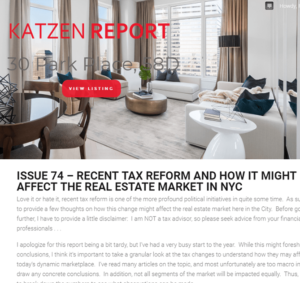Love it or hate it, recent tax reform is one of the more profound political initiatives in quite some time. As such, I wanted to provide a few thoughts on how this change might affect the real estate market here in the City. Before going any further, I have to provide a little disclaimer: I am NOT a tax advisor, so please seek advice from your financial professionals . . .
I apologize for this report being a bit tardy, but I’ve had a very busy start to the year. While this might foreshadow my conclusions, I think it’s important to take a granular look at the tax changes to understand how they may affect buyers in today’s dynamic marketplace. I’ve read many articles on the topic, and most unfortunately are too macro in nature to draw any concrete conclusions. In addition, not all segments of the market will be impacted equally. Thus, I will attempt to break down the numbers to see what observations can be made.
To start, it seems most of the focus has been on tax reform’s reduction in mortgage interest deductions, as well at as the elimination of the deduction for real estate taxes. While there is no doubt these are quite important, this is only part of the broader financial equation. Tax reform also has eliminated the ability to deduct state and local income taxes, which in many cases, is far more significant to the purchasing power of potential real estate buyers.
Let’s start with the general impact of tax reform on each and every one of us living in the City This impact is not specific to real estate, it is simply how your disposable income changes regardless if you rent or own. To show the wholistic impact, there are several positive and negative factors that must be analyzed: 1) state and local income tax deductions are severely limited, but 2) the federal income tax rate is now lower, and 3) the PEASE limitation on total tax deductions has been eliminated. For those of you that may not be familiar with the PEASE limitation, this is a limitation on overall deductions put in place under the previous administration. Thus, our deductions already were limited to some extent, so this elimination provides some offset to the loss of other deductions. While there are other changes to consider, I will focus on these given their relative significance. It’s also worth noting that the impact of these changes is quite dependent on income level, so here is how I see the numbers playing out.
| Effective Marginal Tax Rate Up (+) or down (-) due to: | Total Income (Married) | |||
| $500,000 | $1 Million | $2 Million | $3 Million | |
| Loss of state/local income tax deduction over $10,000 | 2.24% | 3.17% | 3.69% | 4.63% |
| Elimination of PEASE limitation on deductions | -0.33% | -0.71% | -0.93% | -1.02% |
| Lower federal income tax rates | -2.25% | -2.62% | -2.61% | -2.61% |
| Total (negative means LOWER taxes) | -0.34%, -$1,668 | -0.16%, -$1,656 | 0.15%, $2,795 | 1.00%, 30,275 |
As you can see, the net effect of the non-real estate specific tax changes becomes more punitive as income levels rise, however, in most cases, the result is a relatively small percentage change. In addition, at income levels of $1 million and less, after tax income actually rises. When you factor in the wealth that has been created over the last several quarters due to the rise in equity prices (the S&P is up over 30% since the election), which most attribute in some part to tax reform, one could argue many buyers are now in a better financial position. After all, those hit hardest by tax reform are buyers that likely have large investment portfolios and/or equity-linked deferred compensation. This effect will be further reinforced if compensation levels rise due to rising corporate profits.
Now that we’ve looked at tax reform’s impact on consumers’ general purchasing power, let’s look at its impact on real estate more specifically. This part of the equation not only will influence overall affordability, but the decision to rent vs. buy. Of course, the two most significant real estate related changes in tax law are: 1) the reduction in the cap on mortgage interest deductibility from $1 million to $750,000, and 2) the loss of the ability to federally deduct real estate taxes. While I know one can deduct up to $10,000 in these categories, most can use this deduction against state and local income taxes regardless if they own real estate. Therefore, this deduction is included in the general tax analysis outlined in the table above.
Using a 36% marginal federal income tax rate, the numbers on the real estate side look something like this:
Loss of $250,000 in mortgage interest deduction at 3.75% per year: $3,375 ($281 per month)
Loss of property tax deductions per year assuming annual property taxes are:
- $10,000 per year $3,600 ($300 per month)
- $20,000 per year $7,200 ($600 per month)
- $25,000 per year $9,000 ($750 per month)
Total Annual/(Monthly Effect): $6,975 – $12,375 ($581 – $1,031 per month)
When I look at these numbers, what jumps out at me is the impact may be quite different at different segments of the market.
As you’d expect, there is a positive correlation between apartment prices and real estate taxes. So generally speaking, the more expensive the apartment, the higher the taxes. Therefore, for the lower end of the market, taxes will be near the lower end of the range outlined in the table above. In addition, for apartments below $1 million, the mortgage size by definition will be less than $1 million. Thus, the loss of mortgage interest deductibility is not applicable. As a result, these buyers are looking at an increase of less than $300 a month. If you look at the intermediate part of the market (for example, apartments in the $1.5-$2.5 million range), a segment where buyers tend to be reliant on mortgages of $1 million and higher, the total monthly increase in after tax costs is ~$600 per month. For some in these market segments, this cost increase is not inconsequential and could impact the “rent vs. buy” equation as well as overall affordability. However, when you incorporate the fact that many of these buyers are in the income ranges where their after-tax income rises away from real estate related changes, their total decrease in purchasing power is lower. As a result, I do not expect a material shift in these market segments.
When I think about the luxury sector, and thus the higher property tax assumptions shown above, I just don’t believe the impact will be very significant after a potential adjustment period. First, I don’t believe $1,000 a month or less in increased carry costs are large enough to make renting that much more compelling, particularly given how expensive it is to rent luxury product. Second, many luxury buyers either do not take out a mortgage (and thus are insensitive to the interest deduction), or take out mortgages well above the deductibility cap as they believe they can make better investment returns in the market vs. their borrowing cost. In either case, I think the $250,000 cap reduction gets lost in the wash. Third, many buyers in this sector have been the beneficiaries of rising asset prices outside of real estate, which in many cases more than offsets the decline in after tax income. Looking at this another way, let’s think about the increased burden on a buyer of a $5 million apartment. The $12,000 annual increase in carry cost over a 20-year period is a present value of less than $150,000. From a purely mathematical perspective, I suppose one could argue these buyers may lower their bids for homes by this amount. Even if this were the case, it equates to a pretty minor change in price.
So, my personal conclusion? Based on the numbers above, the wealth effect of rising equity prices, and the behavior I’ve seen from buyers to start the year, it does not feel like tax reform’s impact on New York City real estate will be quite the negative many people feared. At least while interest rates and the equity markets remain well behaved!
Have a great beginning to Spring!
Best,
Fran

